The U.S. Should Stay Quiet About The Protests In Hong Kong
In the current situation, speaking out forcefully as some are demanding can only do more harm than good.
The Washington Post Editorial Board argues that the Obama Administration needs to do more to speak up for the demonstrators currently protesting against threats to their political freedom in Hong Kong:
Beijing, however, has not acted yet; police in Hong Kong backed off on Monday and Tuesday after their use of tear gas over the weekend brought more people to the streets. Chinese authorities probably are weighing the risks of allowing the street occupations to continue against those of initiating a crackdown. That makes this a crucial moment for the United States to send a clear message to Mr. Xi: that repression is unacceptable and will damage China’s relations with the democratic world.
Unfortunately, the Obama administration’s response so far has been gallingly timid. White House and State Department spokesmen have carefully avoided offering explicit support for the demonstrators’ demands for free elections for the city’s leader, rather than a managed choice among nominees approved by Beijing. They have urged the demonstrators to be peaceful, though only the police have resorted to violence.
As a supporter of the 1984 agreement under which Hong Kong was transferred from British to Chinese rule, the United States has an obligation to speak up when China violates the spirit of its promise to allow an elected government — as it clearly has. Yet the U.S. Consulate in Hong Kong went so far as to declare that “we do not take sides in the discussion of Hong Kong’s political development, nor do we support any particular individuals or groups involved in it.”
Even more concerning is U.S. nonchalance about a possible crackdown. Asked about speculation that Chinese military units stationed in Hong Kong could be used against the protesters, the State Department’s spokesman said Monday that “I have not seen that potential at this point in time. I can check with our team to see if that’s a concern we have.”
Mike Gonzalez, a Senior Fellow at The Heritage Foundation makes a similar argument:
What foreign liberty-seekers want from us is often not “boots on the ground,” much less “nation-building.” They desire moral validation of their cause, the knowledge that an outside power — the world’s only superpower, no less — stands by them and believes in their cause.
The Soviet dissident Natan Sharansky, for example, has written vividly of what it meant to those in the Gulag to hear that President Ronald Reagan had called the Soviet Union evil:
“This was the moment. It was the brightest, most glorious day. Finally a spade had been called a spade. Finally, Orwell’s Newspeak was dead. … It was one of the most important, freedom-affirming declarations, and we all instantly knew it.”
Support for freedom overseas has been America’s official policy at least since Truman announced his doctrine to Congress, saying that, with Britain exhausted and its empire fading, we had to step up. “One of the primary objectives of the foreign policy of the United States,” Truman said, “is the creation of conditions in which we and other nations will be able to work out a way of life free from coercion.”
But it goes back much earlier, and the founders understood we were to hold the torch of freedom for the rest of the world to see. When we don’t, it creates not just disappointment in places like Hong Kong, but dissonance here at home.
Arguments like this are similar to the criticism that the Obama Administration received for its somewhat muted response to the protests that erupted in Iran in the wake of the 2009 Presidential election when many groups in the country perceived that there had been widespread fraud and political repression accompanying the re-election of Mahmoud Ahmadinejad. At that time, and frequently since then, conservatives have contended that the Obama White House “abandoned” the Iranian protesters by not speaking out more forcefully in their favor. In reality, of course, it was unclear at the time, and even more unclear in retrospect what exactly the United States could have done about the situation in Iran. The government in Tehran certainly wasn’t going to listen to us, and like all authoritarian regimes they seem to have little regard for international public opinion in any case so, if they had chosen to engage in a brutal crackdown (which they did not do even though there was some death and violence) they likely would have been willing to live with the consequences if it was necessary to restore stability. The Chinese acted in the same manner during the Tiananmen Square demonstrations twenty-five years ago, and the Soviets treated American condemnations on human rights issues during the Cold War as a bargaining chip in negotiations rather than something that they cared about significantly. Contrary to the what the Post editors and Gonzalez seem to believe, the persuasive power of the United States to change the behavior of regimes we don’t have real influence over is limited at best.
An outspoken United States in the face of demonstrations like those in China and or the 2009 uprising in Iran also poses the danger of backfiring and actually harming the people that we claim to want to help. If the Obama Administration has spoken up forcefully and publicly for the participants in Iran’s Green Revolution, for example, it would have played right into the hand of regime propaganda that these protests were the result of outside provocation by America and Israel in an effort to undermine the Islamic Republic. There are similar risks at issue with the current protests in Hong Kong. We’ve already seen how, over the past few years, the government in Beijing has exploited Chinese nationalism to shore up support with the public with actions such as confronting the Japanese and Vietnamese over island and oil claims in the waters off China. If the United States were to start speaking up forcefully, rather than behind the scenes diplomatically, for the protesters in Hong Kong, then it wouldn’t be beyond the realm of possibility for the leadership to use those statements to assert that the protests are being manipulated from the outside, and perhaps to use that as an excuse for a more heavy handed response than we’ve seen so far. More importantly, it’s entirely unclear to me exactly what good can be done if the Obama Administration starts doing what the Post and Gonzalez wants it to do. Yes, it would make us feel better but it may actually harm the cause of the people we’re trying to help, and that seems counterproductive to say the least.
Responding to the Post editorial, Daniel Larison argues that their prescription for action is precisely the wrong thing to do:
This is exactly the sort of tense, potentially explosive situation in another country that the administration shouldn’t be talking about publicly. It would be appropriate for the administration to convey its concerns to Beijing through diplomatic channels, and perhaps they have already been doing this, but there is absolutely no need for public declarations or “explicit support” for the protesters. How could that benefit the protesters? The Post doesn’t even pretend that it would. As ever, the desire to have our government “speak out” in support of foreign protesters trumps all other considerations. It’s not as if Beijing will react well to be warned by Washington about how it conducts its own affairs. We know very well that the Chinese government reacts angrily to any hint of foreign interference in their internal politics. Indeed, there are few governments in the world less likely to respond well to statements from U.S. officials about its internal affairs than the Chinese government.
(…)
If the U.S. is to do anything in response to these protests, it must not say or do anything that would offer Chinese authorities even the slightest pretext for a crackdown. If that means that U.S. officials refrain from offering self-indulgent commentary on the protests, then that is what ought to be done.
The first rule in situations should be to do no harm, and at this point Larison is correct that the best way to accomplish that is for American officials to speak softly about what is going on in Hong Kong right now. The only thing we can really do if we follow a more forceful course of action is create a good possibility of things getting worse.
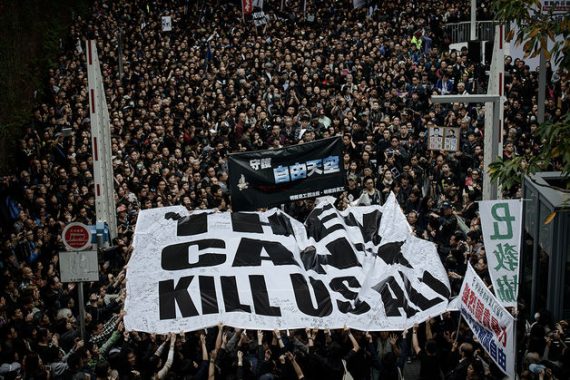

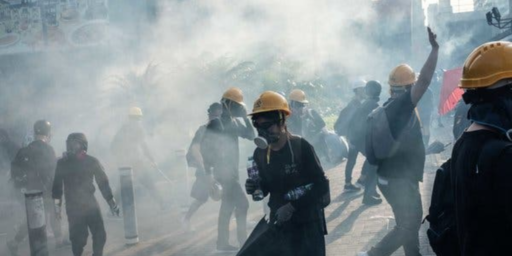
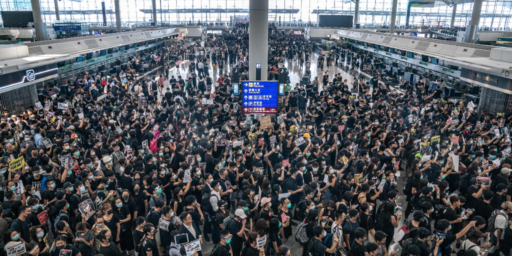
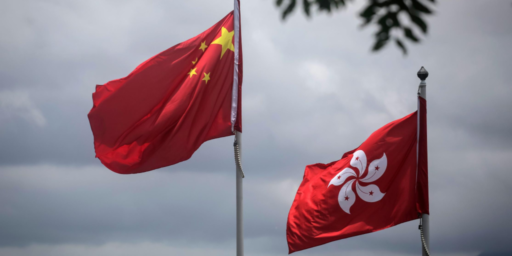
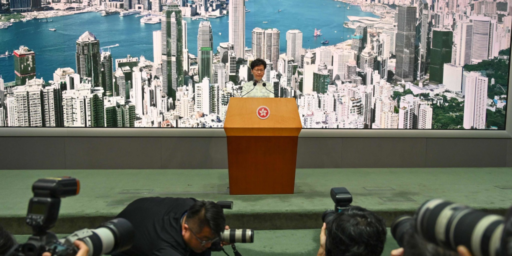
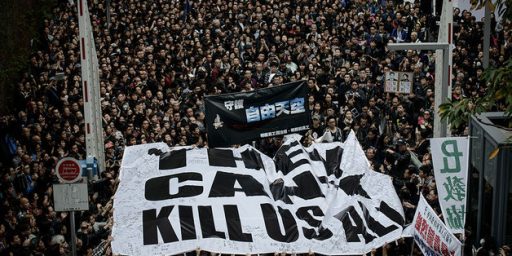
So once again Obama is doing the right thing but failing to bluster and posture to make us feel macho and exceptional. I swear pragmatism is the hardest thing in the world for many people to understand. Apparently including the WAPO editorial board, who should know better.
Saw a post elsewhere that Hong Kong’s share of Chinese GDP has fallen from like 18% to around 2. They don’t have the leverage they’re used to having.
Agree with Doug on all counts here.
I hope it works out for the Hong Kong demonstrators. If they push too hard, I foresee a Tiananmen Square style tragedy-and I can’t think what we can do to prevent that.
Exactly right. Beijing would like nothing more than to point to “outside agitators”. They are already making veiled hints about them as an excuse to take more direct responses.
Saying nothing public is an adult response.
“All that is necessary for evil to triumph is for good men to do nothing.”
“Mr. Gorbachev, tear down this wall!”
Good post, Doug.
@gVOR08:
“Apparently including the WAPO editorial board, who should know better.”
Umm, why? What is the last brushfire in the world they did not advocate pouring gasoline on? They seem to get their foreign policy cues directly from John McCain.
@John425: The Wall fell because the Soviet Union no longer had the will to be sufficiently repressive. For Reagan’s role see @gVOR08: above.
@John425:
If only there was a real leader in the White House, Hong Kong would be a vibrant democracy, and we would all get free cookies…
@anjin-san: Well, anjin-san a real leader would use his moral authority. Oh, wait: The current occupant doesn’t have any.
Of course it doesn’t. The call for a thunder-and-brimstone speech is entirely to make the editors of the Washington Post feel better about themselves; whether it helps or harms the protestors in Hong Kong (who, by the way, are demonstrating against rapidly growing inequality and deteriorating living standards as much as for a more democratic approach to governance) is immaterial to these people.
@John425: I agree. The leader of a nation that goes to war without real provocation, that employs torture and indefinite imprisonment, that uses drones to assassinate people in distant nations has no moral authority. Add to that that his nation has the highest per capita rate of inprisonment and is the only western country that routinely uses execution. I am sure that people in the PRC or any other country on earth are unlikely to see the US as a beacon of selfless goodness.
@Slugger: Funny that the sins of a free nation are dragged through the process and the sins of totalitarians are swept under the rug. Most of the leftists on this blog championed the OWS folks but flee from supporting 17 year old Chinese students.
@John425:
Presumably you’re brimming with moral authority, so what would you do if you were the president that would lead to a materially better outcome? I assume that you think that HW Bush, like you, carried moral authority more to your liking. How do you feel about his reaction to the Chinese protests during his tenure as president?
@John425:
Funny thing, we are responsible for the actions of our government, but we are not responsible for the actions of China’s government.
@Grewgills: We aren’t talking about the Bushes. Stay focused, will you. It’s about Hong Kong. If another Tianamen Square takes place what will Obama say or do? Go golfing?
@John425:
It’s about China and you made it about moral authority or supposed lack thereof being the reason things are going as they are. I understand you wanting to duck that when an analogous situation is brought up that undercuts your attempted argument.